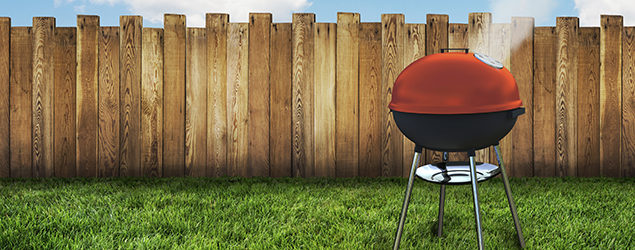Navigating Social Situations as a Vegan
Posted in: Activism, Vegan Living
Tags: Cookouts, Family, Food, Friends, Summer, Vegan
I’ve been vegan for going on two years now, and I’ve been vegan long enough in the eyes of my friends and family that they know it isn’t just some passing phase or weird diet I’m on. From my more open-minded/interested friends and family members, I now get asked a lot of questions. One topic that seems to be touched upon by most of them is the difficulty of maintaining my vegan lifestyle – eating out, having enough variety, difficulty of meal prep, getting proper nutrition, etc. My answer is always this: Figuring out what to eat, while there are some challenging situations, for the most part isn’t the hardest part; it’s dealing with people that can sometimes be more anxiety or stress inducing.
Between my family, my wife’s family, church events and hanging out with non-vegan friends, I get plenty of exposure to all sorts of social food gatherings. Summertime brings way to cookouts and barbecues hosted by our church, friends and family members. I’m happy that both my family/wife’s family and my church are extremely accommodating of our lifestyle and diet choices. However, we didn’t get here without some growing pains. For instance, cheese pizza is NOT a good vegan option for our two-year-old, and the Subway Veggie Delight is, despite its name, not especially delightful to eat. What worked for us, actually, was in the beginning, we never asked or expected people to provide food for us. Whether it was a 4th of July family cookout or a church gathering at the park, we always told people that we would either eat beforehand/afterwards or we would bring our own food. On one hand, this was done to avoid being accidentally served food that wasn’t vegan, but mainly it was done to avoid unnecessary tension between friends and family during these events.
I might guess what some of you are thinking right now – how can we be effective advocates for animals, and for that matter ourselves, if we take a course of action based solely on avoiding tension and conflict? Shouldn’t we be pressing the issue a little more to challenge people’s beliefs and to stir up conversations of veganism, animal rights, the environmental impact of factory farming, etc? Shouldn’t we announce to family and friends that because of our ethical convictions, we need to be provided with suitable animal-friendly vegan options? Some might even suggest we boycott such events where the smell of animals, who have been brutally killed and cooked in a celebratory fashion, is hard to get away from.
While there is certainly a time and place for effective and peaceful boycotts, protests and engagements against animal cruelty what I suggest is that in our quest to be effective animal advocates, we have to adapt multiple fighting styles. Sometimes the key to winning a war is patience – some battles just can’t be forcefully fought, or can’t be won using head-on tactics. We interact and influence the world around us on a daily basis, and in each of those areas we need to develop different tactics. We choose to focus on what we eat, where we eat out, and where we do our shopping – basically deciding where we should put our dollars. This is a passive/direct method of activism which impacts the bottom line. Active/direct methods include boycotts, marches, protests and mass demonstrations. Social situations are another style we have to master – passive/indirect.
So what is passive/indirect activism, who do we use it on and how do we use it? Simply put, it depends on what degree of integrity and consistency you live day to day, especially around the people directly in your sphere of influence (i.e your family and friends). Businesses, lobbyists, and politicians are controlled by public image and money. But how we most influence our friends and family is by being the best we can be, and being an example, the best example of a vegan you can – because for many of you reading this, you are the only vegan they most likely know.
When we take on the label “vegan”, it often comes with many preconceptions and, sometimes, false assumptions from those on the outside looking in. The first step before hopefully effectuating change in those around us was first the breakdown of these stereotypes and myths about being vegan, to not burn down any bridges and to gain legitimacy in the eyes of our friends and family. While cookouts can make us uncomfortable because they glorify eating animals and an industry built on death, disease and devastation, not attending these get-togethers would: A. not have any positive effect, people would eat just as much meat in our absence and would not be persuaded to stop in the future, B. would cause isolation from friends and family that we love and care for and, C. take away opportunities to display a compassionate and delicious vegan lifestyle in the midst of the exact opposite.
When we are invited to cookouts – we try our best to attend. Sometimes we bring a prepared dish or our own vegan hot dogs and burgers to grill up and eat – for us and to share. Often there are plenty of side dishes that are already vegan like pasta salad, fruit salad, chips and veggies with hummus. The important follow up – we never complain or show any annoyance over bringing our own food, and whenever someone has (purposefully or incidentally) brought or prepared a dish that is vegan we make sure to thank them and tell them how delicious it is.
Of course it is painful to witness and smell what is being consumed by the majority of people at a cookout, or any other social function with food, for that matter. Yes, there are always going to be people looking to attack anything/anyone who is different. There will be jokes, some made with good intentions and some with bad. Whenever possible, respond with love and kindness. I find it handy to rehearse responses to different scenarios with my wife beforehand. Try to gauge the situation. Someone coming into a conversation with negativity in their heart is not going to be reachable in that moment but don’t give up on them! They probably just don’t understand what veganism is and are simply defensive because you are challenging something they have never contemplated.
Slowly but surely though, things will change! Without asking, our church now provides vegan meals for us at most cookouts and functions. Many delivered us vegan meals and snacks to our house after the birth of our daughter in June. My close friends now even eat vegan when they come over to our place for a summer cookout. Both my wife’s family and my family now find excitement in finding new vegan recipes to make for us. My dad buys bulk vegan burgers and keeps them in his freezer for when we come over for gatherings. More than just accommodations have come from this, people are now getting curious. Where there used to be jokes and snide remarks, now there are legitimate ponderings and discussions. This progress has all been made in just a little less than 2 years of being vegan.
But trust me, it wasn’t easy. Nothing worthwhile ever is. There were many times we wanted to just get up and drive home from these events. So many times we wanted to just scream at what was happening around us. Frustration from feeling alone and isolated. But if we want to impact the lives of the people around us, we have to be present to do that. Isolation is what breeds ignorance. When we stop and reflect, I think we will find that we have so many opportunities in our daily lives to advocate for animals, and for our planet. Sometimes we get to do it in very direct, head on fashions and that feels so good – we can make immediate impacts on the cruelty of animal agriculture! But not everything – or everyone for that matter – can be handled in a head on fashion. We also need to be present in the lives of those we know, our families and friends, who need us to gently show them the power and transforming effect that a vegan lifestyle can have in our lives, and to restore in their eyes the value of our animal friends and the planet we all share.
We can’t make them listen to us when we argue with them or make them change their ways just by making them try a vegan meal or showing them the reality of animal agriculture. I was shown all of that by my vegan sister and her boyfriend, as well as my at-the-time vegetarian wife, and ignored them for the longest time. When we are invited to attend a coworker’s cookout, a family reunion, or party at a friend’s house, we should accept, if possible, so we can plant seeds of love, compassion and change. I had those seeds planted in me, and eventually I could no longer deny the truth or my aching heart. Now I sit here amazed at how much I’ve changed in these few short years, writing for this blog for the first time to share my heart with all of you who are reading this. I want to fight for a healthier, more sustainable Earth, so my children and their children and the animals and all living beings on this planet have a future. We have so much power, each and every one of us, to fight for a better tomorrow. View every day as a chance to be an advocate, and view being an advocate as part of being the best version of yourself.


Leave a Reply